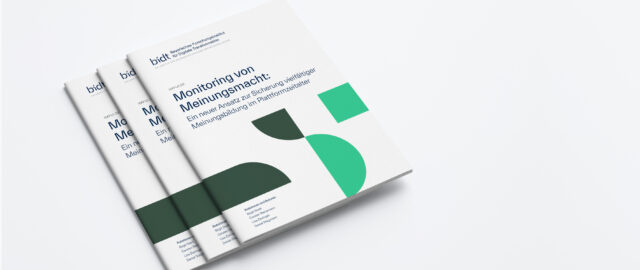The bidt has set itself the goal of researching the challenges of digital transformation and thus contributing to shaping society’s digital future.
On 18 July 2019, the institute was ceremoniously opened.
Meanwhile, bidt supports nine external projects at Bavarian universities and research institutions and investigates questions of digital transformation in three internal research projects.
The spectrum of topics ranges from human-machine cooperation to dealing with opinion power on the internet to China’s social credit system.
First publications from the projects
The first results have already been published. For example, the project “Ethics in agile software development” presents in a working paper how ethical decisions can be integrated in a structured way into the process of software development.
How people experience digital transformation was the subject of the project “Experiencing change”. The results have been published in a study and policy brief.
Study | Policy Brief
Great interest in the annual call for research proposals

The second call for research projects from April to June 2020 also met with great demand: 43 applications were received and are now being evaluated in a multi-stage review process.
“We are pleased about the great interest in our calls for proposals and the exciting project proposals. The initial results from our funded and self-conducted research projects as well as the surveys of the think tank show the high relevance of interdisciplinary research at bidt,” says Dr. Christoph Egle, scientific director at bidt. “With the funding of the interdisciplinary projects across locations and the junior researcher support programmes, we have already been able to contribute to the networking and strengthening of digitisation research in Bavaria in recent months.
bidt studies on home office and AI
The surveys conducted by the think tank at bidt also met with a great response. The think tank analyses developments in digital transformation and has conducted several surveys in recent months. The study on the spread and acceptance of home office as a result of the corona pandemic was widely picked up by the media and companies, as was a study on artificial intelligence, which showed how large the gaps in the population’s knowledge about the technology are.
bidt in dialogue

Bidt promotes open dialogue between research and society. In several events since its opening, the institute has facilitated exchange with those interested in the subject as well as the general public.
With events in the plenary hall of the Bavarian Academy of Sciences and Humanities bidt reached a circle of several hundred participants.
Digital live events

As a result of the corona pandemic, the institute developed the format bidt Werkstatt digital. This digital event series offers a space for sharing experiences, presenting and further thinking about research results. In doing so, bidt relies heavily on interactivity and the engagement of the participants. For the first two events on the topics of home office and artificial intelligence, bidt attracted renowned experts from science and business.
Together with partners, bidt also sought exchange with the public. For example, the institute organised the expert panel “Understanding and Shaping AI” at the Hightech Summit Bavaria with the State Ministry for Science and the Arts.
bidt continues to grow

Setting up the institute brought many challenges in the first year – from finding suitable office space to managing numerous job advertisements and hires to building a digital and agile work and organisational culture. In the meantime, bidt has 23 employees and integrates the former ZD.B support programmes for young scientists: the doctoral programme, the junior research groups and the student innovation labs.
The corona pandemic hit bidt in the middle of the start-up phase, and yet, says Managing Director Dr. Herbert Vogler, it has not led to problems in cooperation: “We already focused on mobile working when we founded the institute”. Herbert Vogler can ultimately draw positive conclusions from the experience of the Corona crisis: “It has confronted us with new requirements in the digitalisation of processes, for which we are currently working on solutions. I am sure that this will ultimately lead to more efficient work and an improved work-life balance.”
Technology opens up many new possibilities. I am convinced that society will successfully overcome the challenges it brings.
 Prof. Dr. Alexander Pretschner To the profile
Prof. Dr. Alexander Pretschner To the profile
According to many experts, the corona pandemic has shown what a crucial role digitalisation plays in work and private life.
“Technology opens up many new possibilities,” says Professor Alexander Pretschner, Chairman of the bidt Board of Directors. “I am convinced that society will successfully overcome the challenges that come with it. We are very pleased about the interest and the great response that our research and expertise have already received in recent months. This motivates us to contribute to laying the foundations for shaping the digital transformation in a responsible manner.”
Gallery















